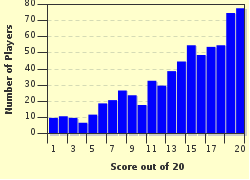Quiz Answer Key and Fun Facts
1. Probably the best way to do this kind of puzzle is to think of works of literature by the author given, then work backward by subtracting letters to get the answer.
Example: Jane Austen work about Rosa Parks
Thinking about Jane Austen works, the first thing that pops into my mind is "Pride and Prejudice." Subtracting a letter from that gives the correct answer, "Ride and Prejudice", which does correspond to the clue. Note that the letter dropped is not necessarily the first letter of the work.
Your first clue, then, reads: William Golding work about the supreme non-truth teller.
2. Charles Dickens work about what Grendel might have had, if he knew that Beowulf was coming?
3. Gustave Flaubert work about a French salute to a female reproductive organ?
4. John Updike work instructing a Jewish leader to participate in a marathon?
5. Fyodor Dostoyevsky work about the fate of traitors in the Ninth Circle of Hell, according to Dante's "Inferno"?
6. Aldous Huxley work about what a first-time listener would do after a performance of Dvorak's Ninth Symphony?
7. Joseph Conrad work about what you would feel in a cave next to a roaring bonfire?
8. Niccolo Machiavelli work about how much something costs?
9. Jack Kerouac work about where a fish that has not yet been reeled in may be found?
10. John Steinbeck work about the expressions that angry people have on their faces, particularly when their mouths are open?
11. Shakespeare work about the sovereign of all otiose appendages?
12. Richard Wright work about the third child at a Passover seder?
13. Thomas Hardy work that takes place miles from the nearest mathematics convention?
14. John Milton work about where God would build the perfect hotel?
15. Louisa May Alcott work that is a small portent of things to come?
16. Thomas Mann work about where Biblical wise men lived, overlooking the valley below?
17. Jack London work about a Caucasian spectator?
18. William Makepeace Thackeray work about something that a proud person might put on?
19. A very quick work by Goethe?
20. George Orwell work about a wing, fin, paw, talon, or other similar appendage?
Source: Author
adams627
This quiz was reviewed by FunTrivia editor
agony before going online.
Any errors found in FunTrivia content are routinely corrected through our feedback system.

